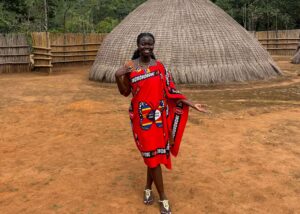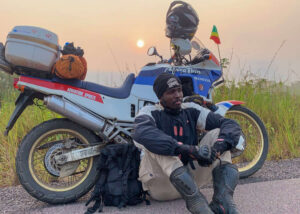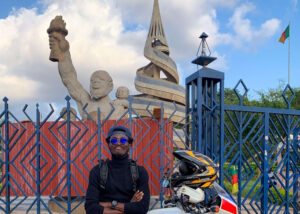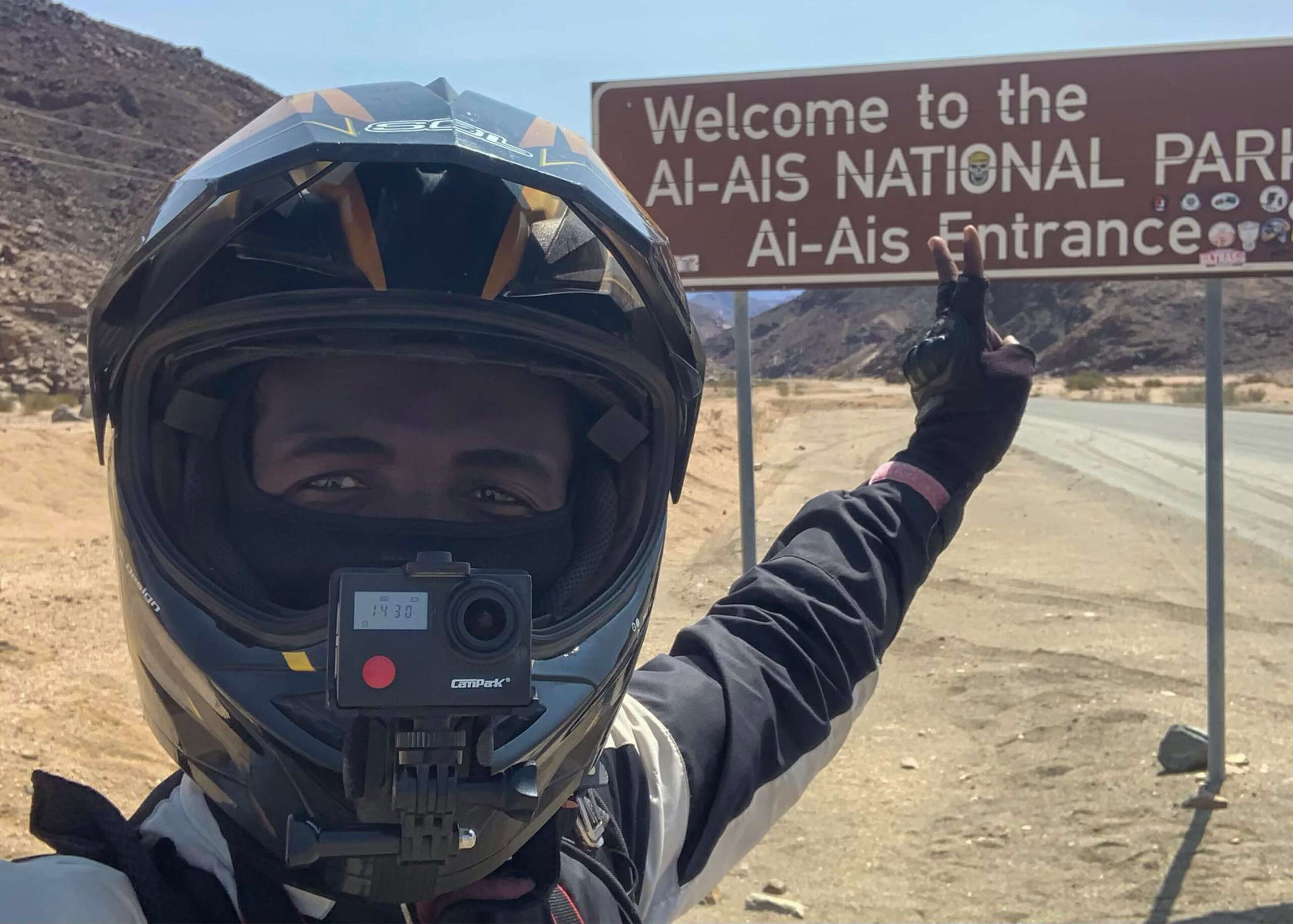By Mary Mundeya
Kimora Smith Mensah is a Ghanaian travel storyteller and tour guide known as Efyakimora on TikTok where she has more than 100,000 followers.
Her journey is rooted in a deep curiosity about Africa and a mission to inspire others to explore it.
For Mensah, food has become a vibrant entry point into understanding culture.
“When I started exploring, I also started trying new things, especially food. I love it,” she explained. “Culture isn’t just about dance or tradition, it’s also about what people eat and how they eat it. Respecting culture means respecting food.”

She recommends following social media content creators—not traditional media—to see what tourism is like in Africa.
Social media has played an unprecedented role in the way Africans travel.
A 2023 report by GeoPoll, a company that uses a mobile platform to conduct surveys and gather data from individuals in developing countries, found that 74% of young Africans aged 18–35 follow at least one African travel or lifestyle influencer.
For many, these creators are trusted sources of inspiration and information, more relatable and authentic than traditional travel platforms.
“The growth of African travel content is not just about aesthetics or wanderlust,” said Kenyan media scholar and cultural analyst Dr. Mercy Obuya. “It’s also about identity, healing, and pride. We’re witnessing a cultural reawakening, and travel creators are central to it.”
According to the African Union, intra-African travel has grown by over 20% in the past five years, a figure fueled in part by the African Continental Free Trade Area (AfCFTA) and visa-free or visa-on-arrival policies now adopted by many countries.
“We are showing people that travel is possible, no matter your background and that Africa is beautiful, safe, and worth exploring,” said Esther Okorougo, a content creator from Nigeria.
In the same spirit of purpose-driven travel, Ghanaian content creator known to his YouTube followers as Flying Flags, journeys with a motorbike, a map and a firm belief that Africa can be united through shared experiences.

His journey is less about speed, and more about stitching stories across borders.
His first taste of what would become a long-distance passion began in northern Ghana, while serving as a student missionary.
“I bought my first motorcycle brand new. Within a week, the odometer hit 1,000 kilometers. That moment made me realise what was possible,” he said.
Not long after, he rode the same bike from the country’s northern region to the capital in Accra. That, he said, redefined everything.
Since then, Flying Flags has travelled through all 16 regions of Ghana and ventured beyond, visiting over 13 countries across West, Central, Southern, and East Africa. Togo, Angola, Zimbabwe, South Africa, and Kenya are some of the places he has seen.

What sets him apart isn’t just the route, but the ride.
“I love to ride, and I don’t have a big budget for air travel or public transport,” he explained.
“Motorcycle travel is economical, reliable, and it gives me the freedom to stop when I want, connect with people, and go where buses or planes can’t. It symbolizes freedom and ambition, it’s unusual to see someone ride a bike across multiple countries, and that alone tells a story.”
From roadside interactions with curious children to spontaneous conversations with village elders, his bike has unlocked human connections that defy borders. In Malawi, he said, the hospitality was so generous it “felt like home.” In Kenya, strangers became family.
He said his travels have reaffirmed his pan-Africanism, a philosophy he had already believed in, coming from Ghana, a country central to the pan-African movement.
His most viral video, a quiet moment at the signpost marking Mpumalanga Province in South Africa has reached over 1.3 million people. Just him, his bike, and the border. “People couldn’t believe I rode from Ghana to South Africa. It made them curious, made them dream,” he said.
His journey is a moving classroom, one that teaches its lessons on the roadside, not in a lecture hall. It’s a story told not just through landscapes, but through the lives of the people he meets.
Every post, every video, every caption helps to break visible and invisible barriers. African content creators are shifting the narratives and challenging stereotypes.
“I used to think traveling across Africa was impossible unless you were rich, but after watching videos from African content creators, I realized we have so much beauty right here and we don’t need to wait for anyone else to discover it first,” said Samuel Chibwe, a university student from Zambia.
Social media users without familial ties to Africa are also following the trend.
“I had no idea what modern-day Africa looked like until I started following African creators on Instagram, they’re showing places and people that just aren’t represented in Western media. Now my dream trip isn’t to Europe, it’s to Senegal or Ghana,” said Hannah North, a university student in Canada.
Yet, even with the optimism and cultural pride that fuels their storytelling, these creators are well aware of the hindrances to free movement across the continent.
For Flying Flags, unlocking smoother travel across Africa lies not only in government action but in how Africans view one another.
“Governments need to work together to make it easier for Africans to move, but we also need to change how we see one another, sometimes the biggest borders are mental. We’ve been made to believe our neighboring countries are unsafe or too different. But on the ground, we’re more alike than not,” he noted.
Their experiences highlight a wider policy conversation that is steadily gaining momentum.
In 2018, the African Union adopted the Protocol on Free Movement of Persons, an ambitious framework designed to grant African citizens visa-free access, residence, and the right of establishment across member states.
While implementation has been slow, with only a handful of countries including Rwanda, Niger, Mali, and São Tomé and Príncipe having ratified it so far, champions of the protocol remain hopeful about its transformative power.
During a 2023 national dialogue hosted by the African Union Economic, Social and Cultural Council (ECOSOCC), William Carew, Head of the Secretariat, called on civil society to help accelerate progress.
“The adoption of the FMP stands as a testament to our collective aspirations for continental integration and economic prosperity,” he said. “I call on you to push member states to take action whenever they drag their feet. Everyone in this meeting is to be an ambassador of change around the FMP conversation.”
That sentiment was echoed by Rwanda’s Minister Judith Uwizeye, who linked the protocol’s success directly to the goals of the African Continental Free Trade Area (AfCFTA).
Speaking at an AU event on economic integration, she said, “Without mobility and free movement, even the AfCFTA will stay challenged, as we cannot achieve free trade properly without free movement.”
Institutional backing is also growing.
The African Union’s Peace and Security Council, during its 661st meeting in Addis Ababa, noted that “the benefits of free movement of people, goods and services far outweigh the real and potential security and economic challenges that may be perceived or generated.”
A micro-influencer with 86 Instagram followers, Nigerian travel storyteller Esther Okorougo encourages African women to reimagine travel.
Her journey began not with luxury or influence, but with a simple decision in 2022 to take her first international trip to Ghana.
That trip sparked a shift in her mindset.
“Growing up, travel felt like something only certain people could do, especially for young African women who are expected by society to just wait around until they’re married before they start exploring life,” she said.
“I wanted to show Africans that it’s possible to explore our beautiful continent, but more importantly, I wanted women to see themselves through my story and know that they can move, they can explore, and they can live fully.”
From the calm streets of Kigali to the vibrant food stalls of Cotonou, Okorougo has travelled across Rwanda, Kenya, Togo, Benin Republic, and Ghana and with each stop, her following has grown, not just in numbers but in purpose.
“It hit me during my second trip, to Benin Republic, people kept asking if the beaches and food I posted were really from Benin. That’s when I realised my content was reshaping perceptions, showing people a different Africa,” she recalled.
Esther’s travel style is grounded in accessibility. Her lens is focused on women-led narratives. She listens to her audience and crafts her routes based on curiosity and affordability. Her viral posts such as “budget destinations under $100” and “affordable countries for girls’ trips” are designed to demystify travel for young Africans.
Among her favourite destinations is Rwanda. “I love how eco-conscious they are. As a sustainable travel advocate, it really stood out to me and the people were just so warm, very welcoming, very patient. I can’t wait to go back,” Okorougo chuckled.
Beyond the beauty and hospitality, she is creating impact. After watching her content, social media users contact her to learn more about travel options and to her that they’ve booked trips.
Africa’s travel storytellers are already demonstrating that true integration is not just a policy dream, but a journey already underway, one road, one story at a time.
_This content is produced as part of the Move Africa project, commissioned by the African Union Commission and supported by the Deutsche Gesellschaft für Internationale Zusammenarbeit (GIZ) GmbH. The views and opinions expressed are those of the authors only and do not necessarily reflect those of the GIZ or the African Union. _
bird story agency
Kimora Smith Mensah, a Ghanaian travel storyteller, has utilized TikTok to inspire exploration and understanding of African culture through food. Social media has significantly influenced African travel, with content creators providing relatable insights that challenge stereotypes.
A GeoPoll report indicates that 74% of young Africans follow travel or lifestyle influencers on these platforms, showcasing a shift towards identity, healing, and pride in African travel content.
Flying Flags, another content creator, illustrates this by journeying across Africa on a motorcycle, emphasizing connections and pan-Africanism. His experiences break cultural barriers, inspiring others to explore the continent without financial constraints.
The growing interest in intra-African travel is bolstered by policies like the African Continental Free Trade Area (AfCFTA) and visa-free travel initiatives.
Despite slow progress, efforts continue to implement the African Union's Protocol on Free Movement of Persons, fostering integration by easing travel between countries.
Esther Okorougo, a Nigerian influencer, supports this movement by encouraging African women to explore the continent, breaking societal norms and reshaping perceptions with content focused on accessibility.
The rise of African travel storytellers highlights a cultural reawakening, driving integration on a personal and continental level.
Through authentic narratives and accessible travel tips, they showcase the diverse beauty and unity of Africa, encouraging both Africans and international audiences to rediscover the continent's potential.
These voices contribute to a narrative change, demonstrating that true integration is already in motion, one story and journey at a time.






